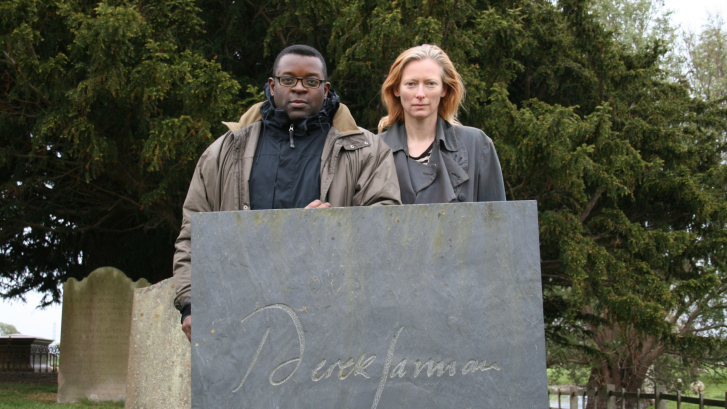Derek

“Letter to an Angel” was written by Tilda Swinton to Derek Jarman on 17 August, 2002 – eight years after his death. In it, she describes her delight at the publication of the DVD version of Jarman’s 1977 work, JUBILEE, as well as her memories of the director whose films marked the beginning of her own career: “You were indeed the great Thatcherite film-maker – for every £200,000 film you made, real profits were seen (by someone or other) within at least the first two years.”
Tilda Swinton’s letter opens this cinematic retrospective of Derek Jarman’s life and work, at the centre of which is an interview that producer and writer Colin MacCabe conducted with him in 1990, during which the Aids-afflicted director takes a look back on his oeuvre. At the same time the film also spans Britain’s history from the 1960s to the early 1990s – since Derek Jarman’s biography and the excerpts from his films reflect a period of immense cultural upheaval.
When Jarman arrived in London in 1960 to study art and literature at King’s College there was barely a sign of the ‘swinging London’ era that was soon to follow. The experimental Super-8 films he made at the beginning of the 1970s anticipated much of the revolutionary punk aesthetic of the second half of the seventies. For more than two decades, Jarman was a crucial force in British independent cinema. In DEREK, Isaac Julien, whose own work was inspired by Jarman’s films, and Tilda Swinton, Jarman’s ‘muse’ and close collaborator, transpose those turbulent times to the screen once more.
details
-
Runtime
76 min -
Country
Great Britain -
Year of Presentation
2008 -
Year of Production
2008 -
Director
Isaac Julien -
Cast
Tilda Swinton, Derek Jarman, Isaac Julien -
Production Company
JN Films Ltd -
Berlinale Section
Panorama -
Berlinale Category
Documentary Film -
Teddy Award Winner
Special Teddy Award
Biography Isaac Julien
Isaac Julien has forged a critical dialogue on issues of race and sexuality through his work in film, video installation, and photography. Julien, who is based in London, first gained international attention in the 1980s for his provocative feature films, documentaries and experimental video works, which explored black and gay identities. His more recent multi-media installation works extend this inquiry into poetic yet politically charged meditations on representations of race and sexuality.
Isaac Julien was born in 1960 in London. He graduated from St. Martin's School of Art in 1984, where he studied painting and fine art film. He founded the Sankofa Film and Video Collective, and was a founder member of Normal Films in 1999. He received the Semaine de la Critique Prize at Cannes Film Festival, and has received a Rockefeller Humanities Fellowship Award; the Pratt and Whitney Canada Grand Prize; an Andy Warhol Foundation Award; Grand Jury Award, KunstFilmBiennale, Cologne, Germany, and a Ford Foundation Award. He has exhibited at the Musée National d'Art Moderne, Centre Georges Pompidou, Paris; Museum Boijmans Van Beuningen, Rotterdam; Art Pace, San Antonio, Texas; FACT, Film Art & Creative Technology, Liverpool, England; Museum of Contemporary Art, Chicago, and Studio Museum of Harlem, New York. His film installations and photographs have been shown at the Whitney Museum of American Art, New York; Tate Liverpool, England; Museum of Contemporary Art, Chicago; P.S.1 Center for Contemporary Art, New York; Irish Museum of Modern Art, and Helsinki Museum of Contemporary Art. His films have been screened at the Dakar Biennale, Senegal; Jeonju International Film Festival, Korea; Rotterdam Film Festival, The Netherlands; Moderna Museet, Stockholm, and Tate Britain, London, among others.
Isaac Julien lives and works in London.
Filmography Isaac Julien
1991 Young Soul Rebels | 2010 Better Life | 2013 Playtime | 2015 Stones Against Diamonds | 2019 Ghost of Lina Bo Bardi
Biography Derek Jarman
Born 1942, died 1994. Studied painting and worked as a costume and set designer for the Royal Ballet. Worked as a set designer on Ken Russell’s 1970 film THE DEVILS. Made numerous short films before directing his first feature, SEBASTIANE, in 1976. His first film to screen at the Berlinale was THE TEMPEST in 1979. In addition to his subversive period dramas and experimental films, he began directing avant-garde music videos in the 1970s. He was also a committed campaigner for gay rights in Britain.